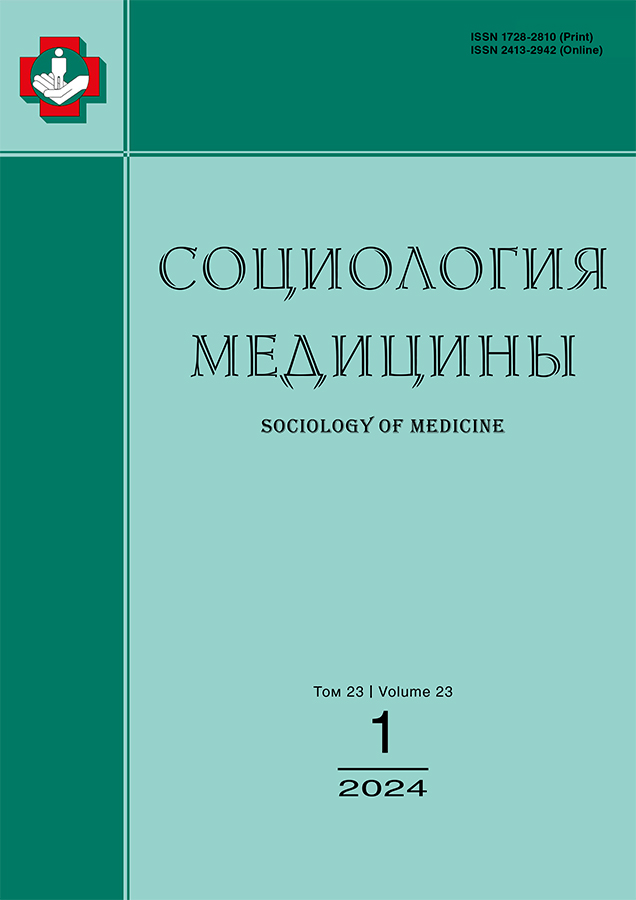Social assessment of the population for the transition to value-based healthcare model
- Authors: Shkarin V.V.1, Donika A.D.1
-
Affiliations:
- Volgograd State Medical University
- Issue: Vol 23, No 1 (2024)
- Pages: 75-81
- Section: SOCIETY AND MEDICINE
- URL: https://rjsocmed.com/1728-2810/article/view/629234
- DOI: https://doi.org/10.17816/socm629234
- ID: 629234
Cite item
Abstract
BACKGROUND: The advanced experience of implementing a value-based model in the practice of Moscow healthcare allowed us to identify a number of the most significant practices of its effectiveness, among which support for making an informed decision by the patient, as well as measuring satisfaction and analyzing the needs of patients were noted. In this regard, the transition of the entire national healthcare system to a value-based model requires the development of approaches to assessing the population’s compliance with such a transformation, taking into account socio-economic, demographic and psychological criteria.
AIM: To consider possible predictors of the readiness of a social group of the population older than working age to transition to a value-based model of national health care.
METHODS: A review of fundamental and modern works in the problem field was carried out. The empirical basis of the work was made up of data from the official website of the Federal Statistics Service with geographic coverage of the entire Russian Federation.
RESULTS: Analysis of data from a subjective assessment of the population's health on a national sample demonstrates the internal readiness of the population for a value-based healthcare model, despite the negative trends of aging. In age groups over 55, the majority of respondents rated it as «satisfactory», with the number of «very bad» ratings being minimal. Positive dynamics in the formation of information technology competence in the population over 65, who are experiencing difficulties in integrating into digital healthcare services, are shown. The positive dynamics of the formation of information technology competence of the population over 65 years of age, who are experiencing difficulties in integrating into digital health services, is shown.
CONCLUSION: The transition of national healthcare to a value-oriented model involves active patient involvement and the formation of patient experience in assessing the results of medical care. In this regard, it is necessary to take into account the personal socio-psychological profile of patient compliance, as possible modules of which the work demonstrates the use of subjective health assessment and assessment of the information technology competencies in the social group of people over working age, the growth of whose numbers determines demographic realities.
Full Text
About the authors
Vladimir V. Shkarin
Volgograd State Medical University
Email: post@volgmed.ru
ORCID iD: 0000-0002-7520-7781
SPIN-code: 7560-1787
MD, Dr. Sci. (Medicine), Professor
Russian Federation, VolgogradAlena D. Donika
Volgograd State Medical University
Author for correspondence.
Email: addonika@yandex.ru
ORCID iD: 0000-0003-3905-5538
SPIN-code: 1403-8524
MD, Cand. Sci. (Medicine), Dr. Sci. (Sociology), Professor
Russian Federation, VolgogradReferences
- Aksenova EI, Kamynina NN. Value-based healthcare: Moscow practice. Moscow medicine. 2022;(5):24–26. (In Russ.) EDN: NMXFDB
- Reshetnikov AV, Sobolev KE, Golikova NS. Problems and current directions for further medium-term strategic planning for the development of the health care system of the Moscow region: expert survey results. Sociology of Medicine. 2023;22(1):5–17. (In Russ.) EDN: COLNKY doi: 10.17816/socm352574
- Zuenkova YuA. Value-based healthcare: analysis of European Institute of innovation and technology health guidelines. Medical Technologies. Assessment and Choice. 2021;(1):28–35. (In Russ.) EDN: WXHHFU doi: 10.17116/medtech20214301128
- Reshetnikov AV, Sobolev KE, Marochkina EB. Social portrait and features of medical behavior of consumers of medical services of the health system of the Moscow region: a medico-sociological study. Sociology of Medicine. 2022;21(2):131–145. (In Russ.) EDN: CUEFWN doi: 10.17816/socm133673
- Porter ME, Teisberg EO. Redefining Health Care: Creating Value Based Competition on Results. Harvard Business School Press; 2006.
- Cherif E, Martin-Verdier E, Rochette C. Investigating the healthcare pathway through patients' experience and profiles: implications for breast cancer healthcare providers. BMC Health Serv Res. 2020;20(1):735. doi: 10.1186/s12913-020-05569-9
- Hurst L, Mahtani K, Pluddemann A, et al. Defining Value-based Healthcare in the NHS: CEBM report [Internet]. Centre for Evidence-Based Medicine; 2019 [cited 2024 March 20]. Available from: https://www.cebm.net/wp-content/uploads/2019/04/Defining-Value-based-healthcare-in-the-NHS_201904.pdf
- Implementing Value-Based Health Care in Europe: Handbook for Pioneers [Internet]. EIT Health; 2020 [cited 2024 March 20]. Available from: https://eithealth.eu/wp-content/uploads/2020/06/ImplementingValue-Based-Healthcare-In-Europe.pdf
- Porter ME. What is value in health care? New England Journal of Medicine. 2010;363(26):2477–2481. doi: 10.1056/NEJMp1011024
- Scheibe M, Herrmann A, Schmitt J, et al. Implementation of patient-reported outcome assessment in routine cancer care: A systematic review of multicentric programs in Europe. Z Evid Fortbild Qual Gesundhwes. 2020;156–157:11–23. doi: 10.1016/j.zefq.2020.08.001
- Aksenova EI, Kamynina NN. Value-based healthcare: a new development paradigm. Moscow Medicine. 2022;(5):4–10. (In Russ.) EDN: WSCDXP
- Eremina MV. Social group "65+": ethical dilemma of the pandemic. Bioethics. 2022;15(1):46–50. (In Russ.) EDN: LPUDCK doi: 10.19163/2070-1586-2022-15-1-46-50
- Donika AD. Information ecosystems as patterns of modern medicine. Monograph. Tambov: Ukom; 2022. (In Russ.)
- Krasnova LS, Kholovnya-Voloskova ME. Quality of life is synonymous with health. Moscow medicine. 2022;(5):84–88. (In Russ.) EDN: MPEKMN
- Rasskazova EI, Tkhostov ASh. Approbation of methods for diagnosing the locus of control of the causes of illness and treatment and self-efficacy in relation to treatment. Bulletin of SUSU. Series "Psychology". 2016;9(1):71–83. (In Russ.) EDN: VRARTP doi: 10.14529/psy160108
- Aksenova EI. The physician assistant is a key resource for the proactive health care program. Moscow Medicine. 2022;(5):64–71. (In Russ.) EDN: KXAJCR
Supplementary files










